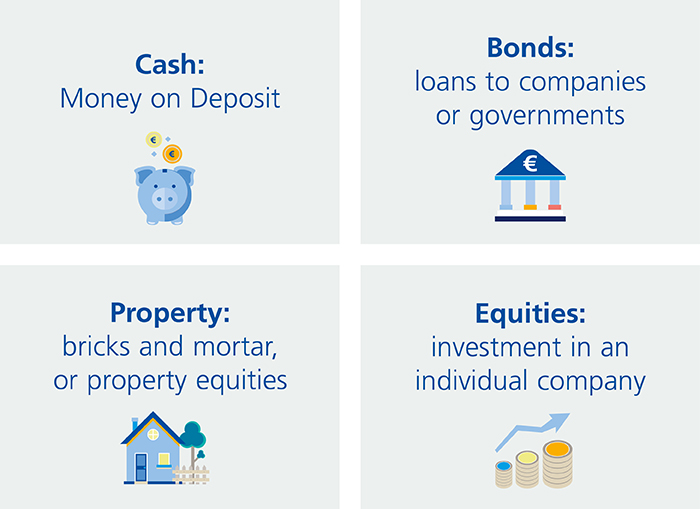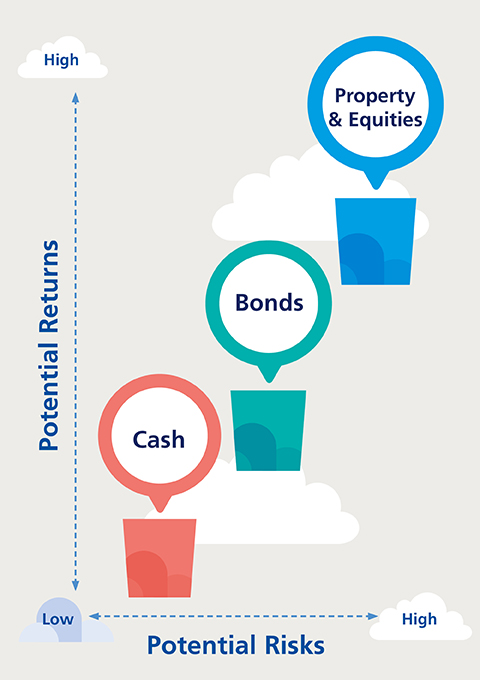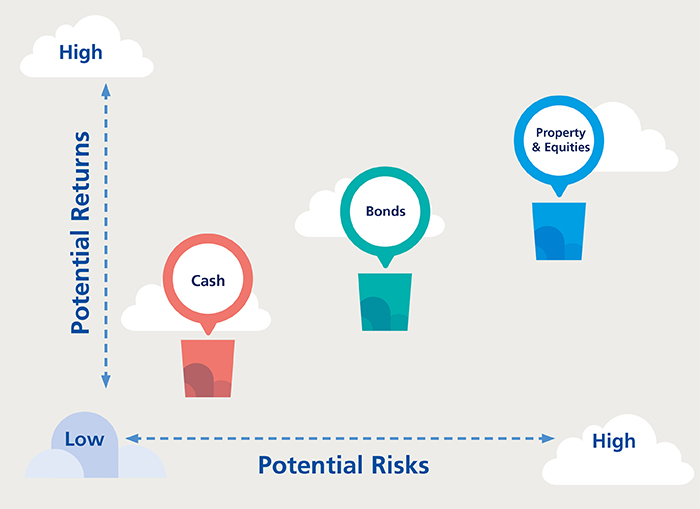What is an asset class?
There are four main types of investment, which are often called ‘asset classes’. Each one works in a different way and carries its own particular rewards and risks. It is important to understand how they work before you make any investment decisions.

Fund managers buy and sell these asset classes on your behalf, hoping that their value will increase over time. The diagram below shows the higher or lower risks attached to the asset classes, and the potential to give higher or lower returns on your initial investment.

Cash
Cash funds invest in cash deposits, for example, in a bank account, or short-term (normally less than one year) near cash assets. In some circumstances, when interest rates are low, the returns on cash funds may be less than the charges on the fund. The returns on a cash fund may not keep pace with inflation, and they are not typically suitable for long-term investments.
Bonds
Many governments and companies borrow money from investors to raise funds and they do so by issuing securities known as ‘bonds’. In return for the loan or bond, interest is paid to the investor until an agreed end date. Funds holding bonds tend to produce lower but more stable returns than funds holding higher risk assets such as equities, but there is still a risk that these investments could go down in value.
There are many different types of bonds, from lower risk government backed bonds to higher risk bonds issued by companies. However, investing solely in bonds for the longer term may result in a lower return than equities. The rate of income on bonds will not keep pace with inflation unless they are index-linked. So, over time, if the rate of inflation is higher than the return generated by bonds, the real value of the bond could fall.
Property
Investing in commercial property is sometimes seen as an alternative to investing in equities and bonds. As well as aiming for capital growth on a property, rental income on property is also a source of return.
At times, the value of your investments in these funds could fall quite sharply. In more uncertain market conditions, it may be necessary to delay your exit from these funds (by up to twelve months).
Equities
One of the most traditional ways to invest is to buy shares in a company, which form the asset class more commonly known as equities. Historically, equities have outperformed safer investments like cash and bonds and can act as the real driver for growth in your investment portfolio. Direct investment in a single company can be risky, as you are reliant on the performance of just one company. Therefore, you may want to consider buying equities through an investment fund, which invests in a range of shares in different companies. Equity funds tend to focus their investment on various countries, regions, industries and investment styles as a way of diversifying, or spreading risk.
Over time, a fund which invests mostly in equities is likely to offer greater potential for higher returns but with it comes greater changes in value. This is because equities are volatile in nature meaning their value can rise and fall quickly. While they carry the greatest risk, they may provide the greatest return over the long term (ten years or more).

About: Managed and multi-asset funds
Some funds may invest in a mix of assets (for example, shares and bonds). These include managed and multi-asset funds. These funds allow you to invest in a range of assets, countries and market sectors, spreading your investment across many different companies and bonds. The fund manager is able to adjust the asset allocation of the fund in anticipation of changing market conditions.
Funds which specialise or concentrate their investment in specific regions, sectors (such as smaller companies or emerging markets) or in a smaller number of shares can result in greater fluctuations in value. Funds that invest in a wide range of sectors or shares generally carry less risk as they are well diversified.
Warning: Past performance is not a reliable guide to future performance.
Warning: Benefits may be affected by changes in currency exchange rates.
Warning: The value of your investment may go down as well as up.
Warning: If you invest in these funds you may lose some or all of the money you invest.
Related articles
Filter by category
Follow us on
 Sending Response, please wait ...
Sending Response, please wait ...
Your response has been successfully submitted.
An error has occurred attempting to submit your response. Please try again.



